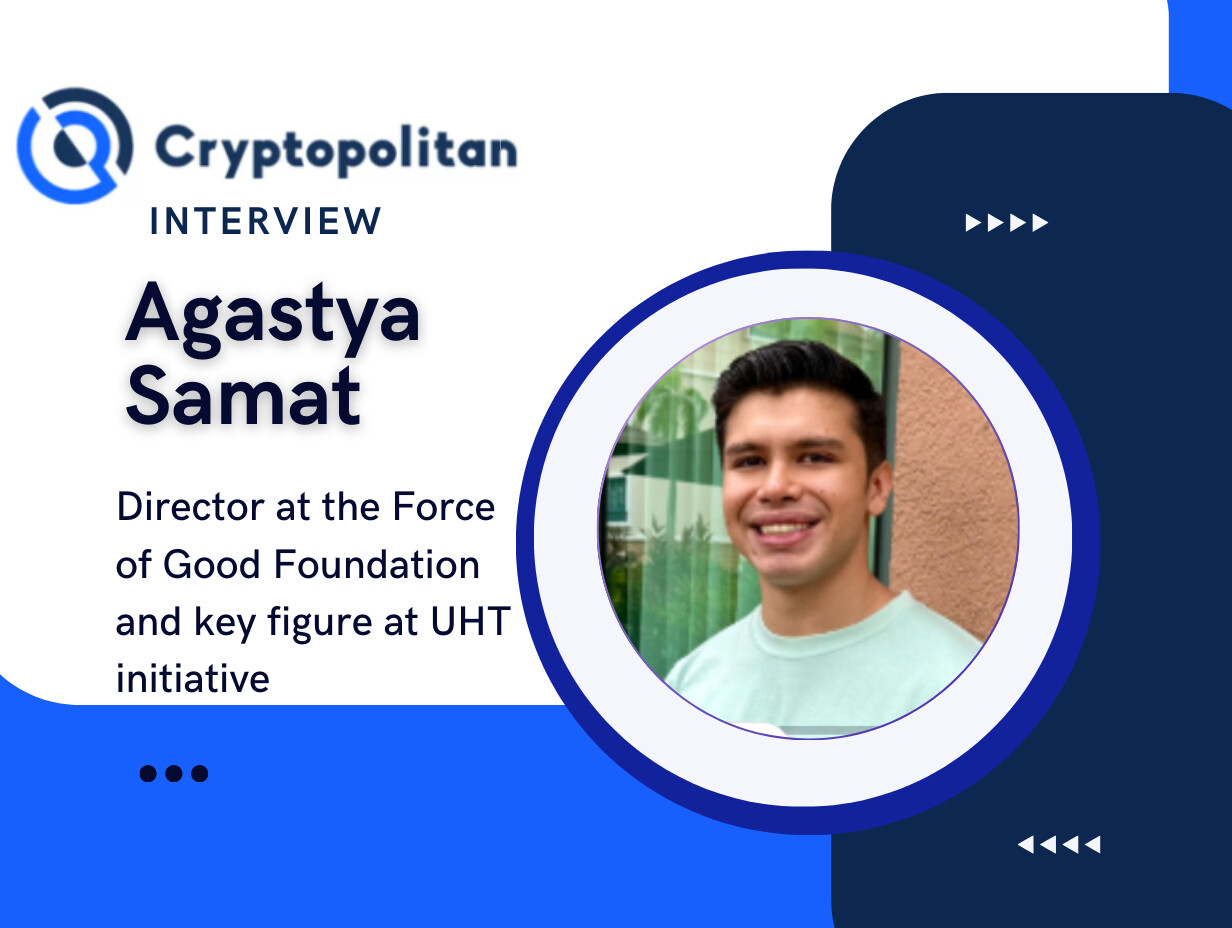In this insightful interview, we talk to Agastya Samat, Director at the Force of Good Foundation and a key figure behind the Universal Health Token (UHT) initiative. Agastya’s journey into blockchain and healthcare is a compelling narrative, rooted in his early fascination with Bitcoin during the 2008 financial crisis and his subsequent career in fintech and the healthcare industry.
In this interview, we explore how UHT is set to revolutionize the healthcare landscape by realigning incentives, promoting healthy behaviors, and leveraging blockchain technology to create a more sustainable and effective healthcare ecosystem.
Agastya Samat’s journey into blockchain technology
Hello, Agastya. Please introduce yourself and share how you got involved in blockchain and your experiences in the health sector.
As a young adult navigating the aftermath of the 2008 financial crisis, the Bitcoin white paper deeply resonated with me. It represented a bold rethinking of the financial system, and I was captivated by its potential. In my first role at a fintech venture capital fund, I was so convinced of Bitcoin’s future that I drafted several papers to persuade my boss to invest in it as though it were a startup. Although I didn’t succeed in convincing them, the experience was invaluable.
This early exposure to fintech and the fund’s success, driven by hard work and a favorable market environment, paved the way for me to take on more hands-on roles in startups. Eventually, I joined GOQii, a health-tech platform focused on delivering preventive healthcare at scale through technology. Working closely with Vishal Gondal, a visionary founder and serial entrepreneur, I gained deep insights into the intersection of health and technology. Being part of the team during significant fundraising efforts, especially when some of the biggest names in web3 participated in GOQii’s Series-C round as their entry into healthcare, was a pivotal experience. Here, I truly recognized the potential of blockchain to revolutionize healthcare.
Universal Health Token (UHT) and its utility
What inspired the creation of Universal Health Token (UHT), and how does it fit into GOQii’s broader vision while adding value to the GOQii community?
The creation of Universal Health Token (UHT) was driven by the need to address the fundamentally misaligned incentives within the current healthcare system. Today’s healthcare model is contributing to a chronic disease epidemic and escalating costs for patients, governments, and insurance companies. The system, as it stands, is not truly about healthcare but rather about ‘sick care,’ where financial incentives often favor treatment over prevention.
Additionally, billions of dollars are spent on promoting unhealthy lifestyles. For instance, the Netflix CEO once remarked that his biggest competitor is sleep, highlighting how our daily lives are increasingly designed around unhealthy habits. Junk food companies spend vast amounts on advertising that encourages poor dietary choices, further exacerbating the problem.
UHT was designed to realign these incentives by rewarding individuals for healthy behaviors. This aligns seamlessly with GOQii’s broader vision of preventive healthcare, which focuses on maintaining well-being rather than merely treating illness. By integrating UHT into the GOQii ecosystem, we add a powerful layer of engagement, motivating users to take charge of their health in a tangible and rewarding way. This enhances user participation and drives meaningful health outcomes, reinforcing GOQii’s mission of promoting a healthier, more proactive approach to healthcare.
How does UHT aim to transform the traditional healthcare ecosystem, particularly preventive care?
UHT aims to transform the traditional healthcare ecosystem by shifting the focus from reactive sick care to proactive health management. By incentivizing preventive care through token rewards, UHT empowers users to actively engage in activities that promote long-term health, such as regular exercise, balanced nutrition, and adherence to wellness programs. This approach helps reduce the incidence of chronic diseases and lowers healthcare costs for individuals, governments, and insurance companies.
Can you elaborate on how UHT gamifies preventive healthcare and how this could impact user engagement?
UHT gamifies preventive healthcare by transforming healthy behaviors into a rewarding experience. By integrating challenges, competitions, and measurable health activities within the GOQii platform, users can earn UHT tokens for their efforts. This gamification approach greatly enhances user engagement by making health management a responsibility and an enjoyable and competitive activity. The impact is profound, turning health routines into lasting habits, which leads to sustained participation and better health outcomes.
What incentives exist for users to actively participate in the UHT ecosystem beyond just purchasing the token?
Beyond simply purchasing tokens, UHT provides users multiple incentives to actively engage in the ecosystem. These include earning tokens for completing health-related tasks, accessing premium health services, receiving rewards from healthcare organizations for adhering to treatment plans, and using tokens in a dedicated health marketplace. This holistic approach ensures that users see real value in maintaining their health, both in terms of physical and mental well-being and financial rewards.
Developing a sustainable product
Can you discuss how partnerships with organizations like Tezos Foundation and Animoca Brands have shaped the development of UHT?
Partnerships with organizations like the Tezos Foundation and Animoca Brands have been instrumental in shaping the development and trajectory of Universal Health Token (UHT). These collaborations have provided us with the technological infrastructure and the strategic insights needed to scale our vision.
The Tezos Foundation has been pivotal in ensuring that UHT is built on a secure, scalable, and energy-efficient blockchain platform. Tezos’ advanced technology enables us to implement smart contracts and decentralized applications essential for the seamless operation of UHT. This partnership has allowed us to offer a transparent, reliable, and sustainable solution that can easily adapt to the growing demands of the healthcare sector.
Animoca Brands, a Web3 and digital asset leader, has played a critical role in integrating gamification and user engagement strategies into UHT. Their expertise in creating engaging, user-centric experiences has empowered us to design a system where users are genuinely motivated to participate in preventive healthcare activities. Additionally, Animoca Brands’ extensive network and influence in the Web3 community have positioned UHT as a pioneering initiative at the intersection of blockchain and healthcare.
How are you working with healthcare providers and insurers to ensure that UHT’s benefits are accessible and valuable to users worldwide?
With UHT, we are ushering in a new era of personalized healthcare products tailored to each individual’s unique needs. This is not just an evolution—it’s the future of healthcare. We are actively collaborating with healthcare providers and insurers to ensure that UHT’s benefits are accessible and valuable to users worldwide.
Imagine dynamic insurance products where your monthly premiums decrease or your coverage expands based on your healthy behaviors. This is no longer a distant dream; we are actively developing with our partners. Integrating UHT into existing health systems and insurance models enables providers to seamlessly incentivize positive health actions, thereby reducing their risk exposure.
But we’re not stopping there. We’re working with pharmaceutical companies to create uniquely tailored treatment programs beyond managing conditions to potentially reversing them. These bespoke treatment plans are designed to address the root causes of chronic diseases, offering a truly personalized approach to healthcare.
We aim to make preventive care the foundation of global health strategies, with UHT catalyzing this transformative shift. By aligning incentives across the healthcare ecosystem, we’re ensuring that UHT delivers value to users and drives a fundamental change in how health is managed and maintained worldwide.
Why blockchain technology?
Selling a blockchain idea to a non-tech audience is a big challenge. How are you bridging this gap, particularly in the health sector?
Selling a blockchain idea to a non-tech audience, especially in the health sector, requires clear communication and a focus on tangible benefits. We bridge this gap by emphasizing the practical outcomes of UHT, such as improved health, reduced costs, and greater control over personal data. Additionally, we collaborate closely with partners like GOQii to seamlessly integrate UHT into familiar platforms, ensuring that users can experience the benefits of blockchain without needing to understand the underlying technology.
What role does blockchain play in ensuring the transparency and security of health data within the UHT ecosystem?
Blockchain plays a crucial role in ensuring the transparency and security of health data within the UHT ecosystem. By utilizing a decentralized ledger, we provide an immutable record of health transactions and activities, making the data tamper-proof and easily auditable. This builds trust among users and allows healthcare providers to access accurate, real-time information, leading to better health outcomes.
How do you see the intersection of blockchain, AI, and healthcare evolving over the next decade, and what role will UHT play?
Over the next decade, the convergence of blockchain, AI, and healthcare is set to revolutionize health management with a more personalized, data-driven approach. UHT is strategically positioned to play a pivotal role in this evolution by providing the infrastructure for secure, transparent data exchange and incentivizing healthy behaviors. As AI becomes increasingly integrated into health systems, the data secured by blockchain will ensure that AI-driven insights are based on accurate and comprehensive information, leading to more effective interventions and personalized care plans.
What are the biggest challenges facing the healthcare industry today, and how can UHT contribute to solving them?
One of the biggest challenges facing the healthcare industry today is the growing prevalence of chronic diseases, which places significant strain on both healthcare systems and economies. UHT addresses this issue by promoting preventive care, the most effective strategy for reducing the incidence and impact of chronic conditions. By incentivizing healthy lifestyles, UHT shifts the focus from treatment to prevention, ultimately leading to healthier populations and more sustainable healthcare systems.





